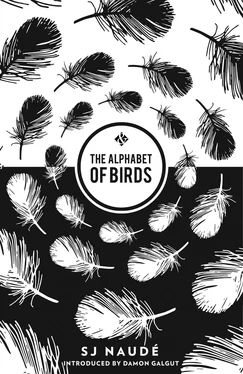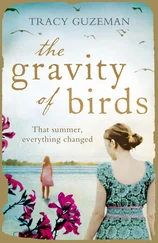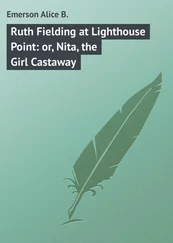Slowly, very slowly, the masked actor glides across the stage of cypress wood. Apart from the stylised representation of a pine tree, the stage is bare. With the flick of a fan and the tilt of a mask, the actor becomes a beautiful woman. One forgets that there is a man behind the second face, the wooden one.
Noh, so his travel guide informs him, was originally called Sarugaku — monkey music. The first actors, according to the guide, were supposedly monkeys impersonating the gods.
The actor’s fan is laid down once he has assumed his position, and is only taken up again when he walks off the stage. The stage hands, clad in black, hand over props. They remain mutely on stage.
The themes are conventional. In the first scene a young woman in love and a desirable warrior appear. The love remains unrequited. In the second scene the woman is a ghost. More beautiful than in life itself. Earthly ties and desires have been transcended.
Hisashi is fidgety. Once he has had enough of the shimmering gown of silk brocade, he finds it all too stilted, too slow. This he imparts by means of a loud whisper. The performance consists of several dramas and lasts the entire day, but they leave after the first piece.
Hisashi stands around looking bored while he is buying a mask in the tourist shop. The kind worn in the play, a Noh-men . He tries on a few; there are a number of traditional designs. He chooses one that expresses a spectrum of emotions depending on the angle at which the wearer faces the audience. A bowed head shows joy, a smile. As the wearer gradually lifts his head, the light now catching it differently, the expression gradually changes. Surprise, then anger. At last, when the onlooker is faced squarely, there is undisguised anxiety.
They drive back. Hisashi is behind the wheel, where he is most comfortable. He is sitting turned sideways, away from Hisashi. He is reading in his guide about rōjaku , the final phase of a Noh actor’s development, when, as an old man, he refines the art of eliminating all unnecessary sound and action, until only the essence of a scene or the action imitated remains.
‘Fuji next,’ Hisashi says.
‘And Aokigahara.’
Hisashi looks at him quizzically.
They stop at the baths next to the highway again. Hisashi goes off to soak himself. He, however, undresses and stands in front of the mirror in the dressing room. He is trying on the Noh-men , dropping his head, practising the angles.
In one sitting she eats more of Hisashi’s dishes than the sum of what he has managed to get her to eat in weeks. And she keeps it in. Hisashi’s visits have a remarkable effect. She is truly improving. She gets up and walks short distances again, as in a New Testament miracle: to the sofa in the living room, once even to the door leading onto the veranda. For a moment she remains standing there, but the frosty breeze against her cheeks makes her teeter.
‘Have you seen,’ Hisashi asks, ‘how transparent?’
‘What do you mean?’
‘She is now a ghost.’ Hisashi ogles him; unexpectedly, there is lasciviousness in the Japanese man’s heavy fingers.
‘It’s time for you to go, Hisashi.’
He leaves.
He keeps an eye on his mother from the garden. She is like a marionette when Hisashi arrives. The air in the house changes, stirring her limbs. When he leaves, she falls back onto the pillows like a rag doll.
Outside the bathroom window, the mesh of grey winter twigs creates complex patterns. He is bathing her, not for cleansing, but against the pain, which briefly flees before the warmth. The knobs of her knees are outlined against the white enamel. He pours piping hot water over her, aims it at the pain.
He wakes up in the early morning hours. The tinkling of a bell. Unmistakeable in the nocturnal winter air, the air that is crystallising around him and his mother. The silver sound brings relief. He recognises it instantly. He walks down the stairs. He finds her in the kitchen, sitting at the table in her white nightgown: in electric light, in front of an empty plate.
‘No,’ she shakes her head when he asks whether she has rung the bell, ‘it’s in the bedroom.’
The voice is hollow. It is coming from afar. She starts keeling over, weightlessly. There is nothing left of her.
‘Sea of trees’: that is what Aokigahara is often called. But here in the pine forest, where he and Hisashi are walking along a footpath, Hisashi hesitant behind him, it does not sound like the sea. It is the quietest forest in Japan. Perhaps that is why people come here to kill themselves. About fifty bodies are found in the forest every year. Notices are pinned to trees, in Japanese and English, trying to dissuade those planning to commit suicide. A small bouquet of flowers is tied to a random tree. Areas to both sides of them are cordoned off by blue ribbon. Volunteers come to scour the forest each year, according to his travel guide. The ribbons are put up to delineate search areas.
Through the treetops, there is the occasional glimpse of Fuji. The sky above the snowy peak is the brightest shade of blue he has ever seen.
‘Have you seen enough? Can we go back?’ Hisashi wants to know.
He shakes his head, striding ahead. Here and there a figure is visible at a distance, on other paths, through the trees.
They sit down to rest for a moment. The silence penetrates the skin. He reads in his guide that ubasute was practised here up to the nineteenth century — the practice of leaving an old and enfeebled parent in a remote place to perish of hunger or exposure. There is a reference to an old tale of a man carrying his mother up a mountain on his back, planning to abandon her there, at the peak, to the elements. On the way there she snaps off twigs, scattering them behind them, so that he will find his way back down and not perish with her.
‘Shall we turn around now?’ Hisashi asks.
He shakes his head. ‘I want to go further.’
They have hardly started walking again when a figure appears against the light, some distance to their left. Not on a path, but between the trees. The figure stops, then remains quite still. They stop too. Something in the silence compels him to open his backpack and take out the Noh-men . The afternoon sun is shining through the leaves. He wants to put on the mask. He will adjust the angle, lift his chin all the way from below. He will know exactly what the effect is of every degree of tilting. But the mask stays in his hands. The figure just keeps standing there, as if petrified.
Then the figure lifts his arm and points. He looks around. Behind him, Hisashi has lain down flat on his back in the path. Motionless, eyes open.
Hisashi is sitting next to her on the bed. He is standing around, as if supervising.
She points to the wild gardenia growing near her bedroom window. ‘Go and pick me one. Please.’
Hisashi trots outside elatedly. The flowering time is in fact over; there are just a few flowers left. The slightest draft causes more to drop. He keeps an eye on Hisashi through the window. When his thick fingers stir the small shrub, a spray of flowers sifts down onto his feet. He brings one inside. She smells it, shakes her head slightly.
‘Nothing.’
He goes and picks another, and two more after that, until she detects the last whiff of summer and smiles quietly, eyes shut.
In a week’s time it is his birthday.
‘By that time, I’ll be walking around again,’ she insists.
The corners of her mouth are pulled downward by the pain. She wants to know what is left in the freezer for a birthday meal. He feels paralysed, unable to formulate an answer. Everything, is the answer, the entire colony of misshapen cadavers. He closes his eyes. He can imagine the last words, when they come, sometime or other in the next few days. As has become his habit, he will bend over her, lower down this time, to catch the last puff of her breath: ‘Take something from the freezer,’ she will say. ‘Let it thaw for dinner.’
Читать дальше












